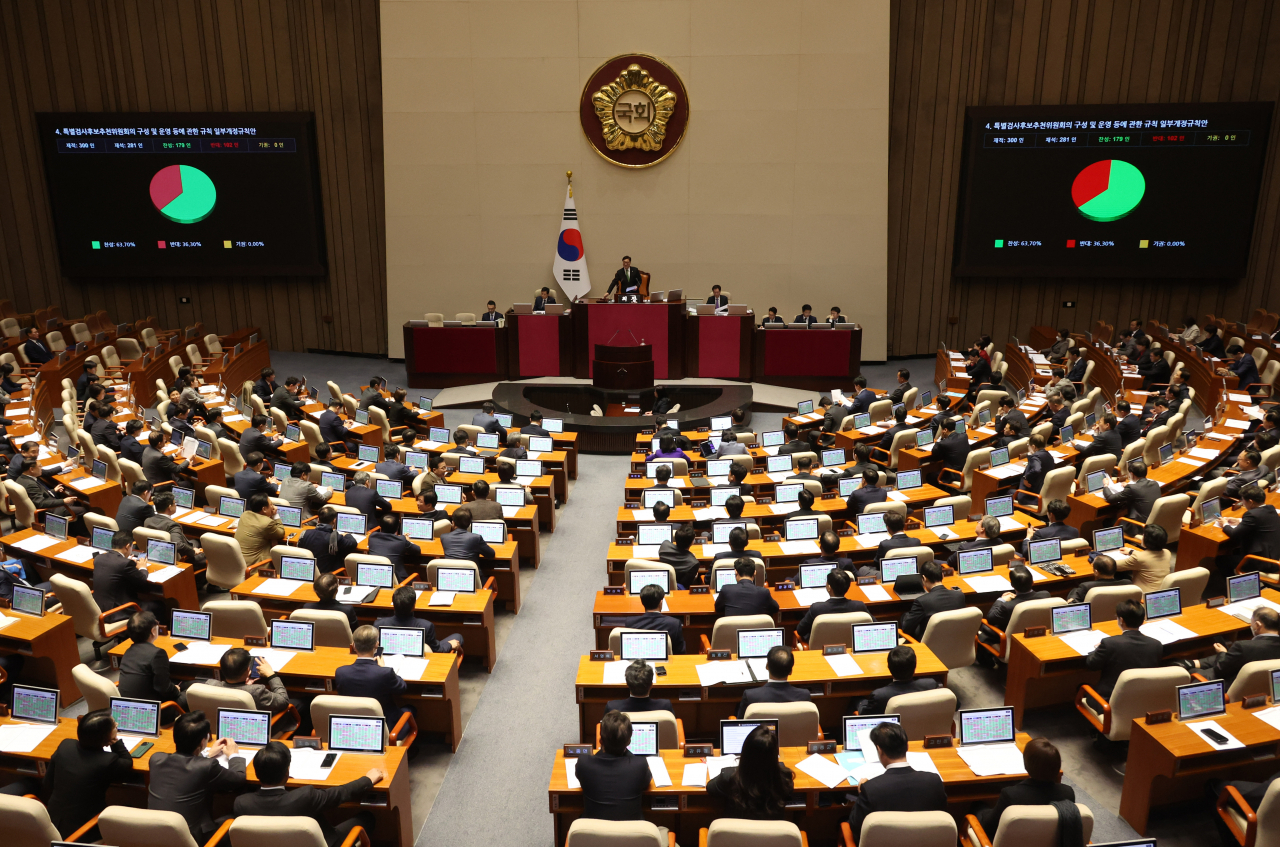 |
Lawmakers vote for revision to the Act on the Appointment of Independent Prosecutor during a plenary session of the National Assembly in western Seoul on Thursday. (Yonhap) |
The opposition-led National Assembly on Thursday passed two bills that could limit the authority and the power of the current ruling bloc.
The Assembly, in a 179-102 vote, passed a bill that strips the current ruling People Power Party of the right to recommend candidates for a special counsel when investigating allegations against the president or the president’s family members.
The revision to the Act on the Appointment of Independent Prosecutor bans the political party that the president is a member of from recommending a special counselor candidate under such circumstances. The bill is not subject to a presidential veto, so it took effect immediately.
The previous law stated that a seven-member committee, formed of two lawmakers of both the ruling and the main opposition each, the deputy minister of justice, and two other two experts could recommend the members of a special counsel under all circumstances.
The revision took away the two seats that the People Power Party had on the committee and distributed it to lawmakers from other opposition parties, for cases that involve allegations against the president or the president’s family members.
The president still has the authority to confirm the recommendations.
The Assembly also passed a separate revision to the National Assembly Act in a 171-101 vote, that would abolish the automatic forwarding of the government's budget proposal to the plenary session if bipartisan agreement is not reached by the deadline. The current system allows the Cabinet to automatically forward the budget proposal even when they fail to pass through parliamentary standing committees by Nov. 30.
The rival parties have currently locked horns over the government’s spending budget for next year, with both the Nov. 30 deadline for the budget to pass through the standing committees and the Dec. 2 statutory deadline for national budget approval fast approaching.
President Yoon Suk Yeol is expected to veto the bill, with Finance Minister Choi Sang-mok saying that he will request the president to exercise his veto power.
In Thursday’s plenary meeting, a contentious grain bill requiring government intervention to stabilize rice prices was passed in 173-80 vote, with one abstention. The bill requires the government to take measures, such as buying surplus rice or releasing government stocks, if rice prices fall or rise sharply.
This marks the third time that the Assembly passed the grain bill. Yoon has vetoed two similar bills in the past and both bills were ultimately scrapped after failing to pass in revotes.
Meanwhile, the main opposition Democratic Party of Korea plans to propose an impeachment motion against Board of Audit and Inspection Chair Choe Jae-hae, during a plenary session scheduled for Monday. The move marks the first time in history that an impeachment motion was proposed against the head of the state audit agency.
The party’s spokesperson Rep. Noh Jong-myung told reporters that Choe failed to comply with the Assembly’s questioning and scrutiny of the controversy surrounding the presidential residence’s relocation in 2022. Critics have accused the state audit agency for failing to look into the allegations that the first lady hired her acquaintances, who did not have the licenses to carry out the constructions for the relocation project. Noh cited Choe’s potential violation of the Act on Testimony and Appraisal Before the National Assembly, including the failure to submit requested materials in parliamentary hearings.
A motion to impeach Lee Chang-soo, chief of the Seoul Central District Prosecutors Office, and two of his deputies in a National Assembly vote will be submitted by the Democratic Party next Wednesday, as well. The party has accused them of not indicting the first lady over her alleged involvement in the stock price manipulation scandal.
By law, an impeachment motion should be put to a plenary vote within 24 to 72 hours after it was reported to the first general Assembly session following its proposal.
The National Assembly also approved the ratification of the 12th Special Measures Agreement with the United States, detailing Seoul’s financial commitments for hosting US Forces Korea from 2026 to 2030.
In contrast, the SMA is classified as an executive agreement in the United States, bypassing the need for Congressional ratification.







